
2023 November❮❮prevnext❯❯
2023.11.01
Open Photo Gallery


2023.11.02
I made an interactive Halloween costume this year - The Magic 8-Ball!
I asked a friend (Paul Gregory) who makes drummer and equipment gear to construct a wearable iPad harness, and then using P5.js I wrote a fullscreen webpage to pick one of the classic 20 answers and display it in the classic triangle: toys.alienbill.com/8ball It was fun to iterate on from a usability and "surprise and delight" standpoint:
1. I didn't really want to "shake for new answer", so I did a simple tap that made the new answer fade in and rotate into place. I then added some logic to have the cursor or finger shove the blanked + dimmed triangle around until released (just for a little showmanship as the person was thinking of their question)
2. I made variants to rotate everything 90 degrees so by locking the screen rotation, the straps could obscure the status bar.
3. At the party, I thought of one great feature: a cheat mode. Now, tapping inside the circle gives you a fair answer, but if you click outside the circle, the top half of the screen gives you one of the 10 positive answers, and the lower half gives you one of the 5 negative responses. So based on the question someone asks, you can covertly trigger a yes or no answer based on whatever is funniest.
So, classic example of the importance of testing and iterating!
(I am still on a jobhunt, so if your team might use a UI Engineer who can do the bread and butter React/Node/Typescript as well as throw in a Canvas curveball like this, hit me up!)
kind of an anemic month for new music tbh...
4 star:
Chocolate Drop (Howlin' Wolf)
Finally persuaded Melissa to watch Backbeat, the semi-documentary about the early Beatles in Hamburg... Stu Sutcliffe is painting to this song
Use Me (Bill Withers)
Melissa sent me an instagram post about the James Gadson drumming in this...
Opening Theme (From "Aqua Teen Forever: Plantasm") (Run The Jewels & Aqua Teen Hunger Force)
I never got deeply into the cartoon, but Run the Jewels is always a good sound
3 star:
The Preacher and the Slave ("Pie In the Sky") (Joe Glazer)
Perfect Timing (This Morning) (Orba Squara)
Pop Goes the Weasel (3rd Bass)
Corazon de Tango (Doctor Deseo)
Barbie Girl (Aqua)
Hits 2000' (feat. Trinix) [Mashup] (Trinix Remix)
Desperado (The Langley Schools Music Project)
2023.11.03

2023.11.04
2023.11.05
But I guess - and it may sound callous, but I think it's morally ok to identify and recognize the awfulness but to keep it in your *head* rather than your *body*. Strong emotions are a way of trying to ensure useful action, but you *really gotta pick your battles*, because there are SO many battles to choose from. (I think of that line from Garrison Keillor's "Don Giovoanni": "Helpless rage is a major cause of falls in the home.")
I think some of the problem is that we *know too much of the world*. We're probably wired to deal with the slights and injustices of our family, our village, our village's feelings about our neighboring village, and not much beyond - all scenes where our input can make a crucial difference. But we take it on ourselves to understand local scenes and large trends from far away. But for most of those, we can't materially fix things! (Though we also get our ears full of anecdotes of great people, outliers, who DO make a difference, and we get frustrated we can't be more like those heroes of the new pantheon.) Frustration. And then: expressing the appropriate outrages is also a form of group cohesion, so you need to be careful not to sound like you're invalidating the outrage of your peers. (And fwiw signaling rowing in the same direction as your peeps in general is more important than being "correct" on any single issue - this fact cranks up polarization)
And complicating it further is having the individual appropriate outrage can be a LITTLE useful to helping the world right itself. It's like voting: if you are sick or break your leg and miss a vote, that's ok - either your candidate wins anyway, or they lose but it wasn't by a single vote. Your vote can only really matter as part of an emergent trend, and participating in conversations and writings about the issue before hand is as or more important than your physical vote, since that has more potential to nudge the trend.
So maybe those thoughts from that conversation were in my head as I dreamed last night; Dylan was driving Matthew G's car and RV (or maybe Matthew was driving Dylan's - I hate how hard it is to recall dreamtime!) with us in the back, and the road was unplowed from vast amounts of snow, and the car was underpowered for the trailer, and each time we plowed into a snowdrift it wasn't clear we'd make it through. And I'd close my eyes before each drift. And Melissa who was in the back with me asked me about it, and I said it was for emotional regulation, not getting too scared about something out of my control. (And I think that happens in real life for me - like when I was less confident at helping my band run itself, or maybe my own tuba playing, I would shut my eyes, especially if a performance was floundering a bit. Which, you know, is likely less helpful than being eyes open and communicating more! But I made myself grow past that and look at my band with eyes wide open.)
So I woke up asking if diverting one's attention is a "legitimate" form of emotional regulation, or if you always have to plow into the worst news, feel the full outrage boil in your gut, and still control it. (My dream tried to make a joke it couldn't quite land, about a parallel tendency to procrastinate on reading emails or what not... the joke was something like "see there's all these different communication forms - with texts, it's likely to be bad news. But then compare to email, which is likely to be bad news. Or to a call, which is likely to be be bad news. Or FB messenger, which like text is likely to be a short form of bad news [...]")
Interesting that my dream featured Matthew (whom I had had dinner with that evening before a mutual friend's birthday party) and Dylan - who showed us the "it makes sense that you feel that way" line, which can validate having the emotional response without fully endorsing or confirming its rational, objective basis.
2023.11.06
Peter Singer has a thought experiment that asks "would you sacrifice an expensive pair of nice new shoes to wade into a pond and save a child", to which most people answer yes, but then moves on to the zinger "well millions of kids are dying from preventable diseases and not having mosquito nettings, so why aren't you donating more to good charities?"
There's a further study that claims to have data that shows us that our intuitive moral compasses are untrustworthy; like if you see a photo of a malnourished child you're X% likely to be willing to help, but that % goes down if her brother who is also suffering is added to the photo - and down further if you see her whole classroom in the same state. According to common sense and an economist's way of looking at things, our willingness to help should always scale up with the scope of the problem - obviously.
This kind of idea forms of the basis of a movement called "effective altruism". On the main I'd say it's healthier than the libertarian stance that says we all prosper more with "every man for himself" and shunning communal efforts to fix things (especially if there is any coercion involved.) Like at its best, it recommends programs of *automatic* giving (sometimes interestingly akin to tithing) where a percentage of your resources are automatically devoted to known effective causes, thus becoming an ambient expense you don't think of much, and any further giving you do "for the feels" is just a cherry on top. But at its worst - as seems to have happened in the recent Sam Bankman-Fried case - it can be used an excuse to gather as much wealth for yourself as you can, by any means at hand (no matter how scammy) because the percent you sock away for charity will be greater than the worthy charity would have received otherwise.
Thinking back to the example of the photo of the girl, then the siblings, then her classroom - we may well be a little too quick to pivot from "this is an individual tragedy I can help make right" to "this is just the way the world is, I can't really change that, and so I should just tend to my own garden" but my hunch is that the answer isn't everyone becoming as much as a martyr as they can for good charities. But I admit my reasons as to why seem a little weak. Like, I do understand the hedonic treadmill, how most people adapt and return to a semi-fixed happiness setpoint regardless of circumstance, so most suffering isn't as linear and preventable as it might seem. Or maybe I'm too sympathetic to the libertarian idea that "got mine, screw you" actually keeps incentives in line with rewards so leads to good outcomes. But I think a lot of it is a defeatist realism that knows my own capacity to improve the world is dwarfed by the problems it has, and being too driven by wide empathy for people suffering from unsolvable problems is a recipe for personal misery. (Which was basically what I was saying yesterday)
Also, I think relative to some philosophies I associate with "the East", too few Western philosophies recognize moderation as a virtual for its own sake! Like, if something is good, a lot of philosophies say "crank that up to 11!" and if something is bad, crush it without mercy - but in practice you need to find a balance - somewhere between being conservative for status quo's sake (because change is scary) and being able to recognize that everything in the status quo has history and reasons for it. Most people's motivations are towards a good. If that good is too self-directed or greedy or comes too much at a cost for others, then that "good" might be objectively evil - but there's still some kind of subjective positive goal at its heart.
How to work a wall. Your shadow - "don't be afraid, it's your friend"
If we take a breath and sift through the DEI (diversity, equity, and inclusion) literature in which objectivity is negatively characterized, there's disappointingly meager evidence of a diabolical plot to obliterate shared reality, or to force engineers to consider cultural factors when calculating thrust and lift. Rather it appears to be a way to talk about the more modest domain of institutional power relations. In a school or office, "objectivity" can be a pose or performance, a way to claim authority or deny it to those whose behavior doesn't conform. The claim is not that the speed of light depends on how you feel, man, but that certain kinds of affectless social performance are coded as white and used to police non-white people. The opposite of "objective" in this case would be the stereotypical "angry black woman." If you're expected to behave emotionally and "irrationally" you will be forced to adopt a rigorously neutral demeanor or find yourself at a disadvantage compared with others whose objectivity is assumed. In a Supreme Court confirmation hearing, Brett Kavanaugh can raise his voice and talk about beer, whereas Kentanji Brown Jackson has to demonstrate angelic calm.Even in the engineering cases (the "thrust and lift" is referencing a Dawkins quote on how aeronautical engineers obviously work outside the realm of cultural relativity) - I think about how for decades the "crash test dummy" for airbags was set to "typical dude" - your numbers may be objective, but what you chose to gather data on might not be.
I'm not sure if we have good language for charting the middle course between objectivity and subjectivity. There is a shared reality, but we have at the very least poetic proof that certainty of what that reality is is impossible to achieve. And one of the most likely true facets of the Objective Truth is that for individuals, it's the Subjective Truth that really matters.
Radiolab: The Secret to a Long Life My Cathleen sent me this podcast link, saying it reminded her of me :-D
The TL;DR summary is: you can try to filling your life with novelty to try and avoid the way days, weeks, months, years start to run into each other. But that can be stressful and exhausting! You can also try to practice more mindfulness and observation and appreciate the beautiful complexity and newness that is there all around us all the time.
I guess I try to do some of the latter - blogging (and private journaling) daily for over 20 years, doing "One Second Everyday" videos for 10, making a few "Timeline Apps". I'd actually recommend all of that to anyone. It doesn't totally solve the dilemma - all those years still kind of run into each other - but it's nice to have a sem-tangible record and reminder of all the sand that has slipped on through the hourglass.
Low key delightful Sinking Lego Ships - sometimes I wish I had gotten more into gear Lego Technic, rather than just using it to make cool looking spaceships...
Ah yes, the season where the result may be negative for COVID but ALWAYS positive for a lil' nosebleed.
2023.11.07
Open Photo Gallery



Is it just me or is it kinda scammy how PayPal lumps "automatic recurring payments" with every other type of "automatic payment" (i.e. you don't have to log in) ? No filter by "recurring", no sort by last charged, just a giant alphabetical list - starting with 5 or so, then adding like 8 at a time with "see more"?
It's almost like they don't want to make this stuff easy to review...
2023.11.08
After Peter Jackson's Get Back documentary, they realized the technology, now backed with AI, had advanced and they decided to release Now and Then as the last Beatles song, with contributions from all 4:
There's a nice short film about the making of:
I admit it made me a bit tear-y.
On a tangent: for the first time I looked up the lyrics to "Maxwell's Silver Hammer". What the hell McCartney???
I didn't really encounter the Beatles until college, and even then it was more of the "Past Masters" compilations, so I've always been a bit behind on their later stuff... so I assumed "Maxwell's Silver Hammer" was, like, one of those quirky silly songs like "Octopus's Garden" or "Yellow Submarine", not a tale of a hammer wielding serial killer!
2023.11.09

2023.11.10
But the weirdest part was hanging out in a room with the writers of Penny Arcade? And they were getting ready to graduate at some kind of commencement ceremony, except instead of normal pants they wanted to keep wearing shorts or something under the graduation gown, and so elected to wear just the bottom quarter of pant legs with an elasticized top on each leg, like bizarre khaki leg warmers.
I started teasing them with a song to the tune of Billy Joel's "The Longest Time" -- "Whooaa, whoa whoa whoa -- you deserve real pants" and instead of "That hasn't happened for the longest time" it was "And you can wear them for several times", answering how it was some kind of economizing that got the artists wearing such weird hybrids...
...I think the stress of funemployment might be getting to me.
I do suspect I make typos more regularly as I age, especially phonetic/homophonic ones (or "mouthfeel" ones like the m<=>b swap like "me" for "be".) It's a little alarming to observe, but I don't think necessarily a harbinger of a slide down senility mountain.
So I'm always a little relieved when I see members of this family of typos from back when I was younger - I just found the king of youthful phonetic typos, this typo from a middling story I wrote in college, "Angels and Sam":
"because he couldn't figure out which answer he was hoping to here."
Ah well, like I always said "I want to live like I type: fast, and with a lot of mistakes"
Keep your eyes open, people.
2023.11.11
Open Photo Gallery

2023.11.12
It sounds like you're referring to a concept in Norse or Viking mythology related to the belief in multiple parts of the self. In Norse culture, it was believed that a person was composed of several parts that made up their whole being. This concept is somewhat complex and can vary in its interpretation, but generally, it includes these elements:I'm always interested in psychological "parts" theories and models...
Líkamr (Lík): This is the physical body, akin to the concept of the body in modern understanding.
Andi: This is the breath or the life force, similar to the concept of the spirit or soul in other cultures.
Hugr: Often translated as the mind or thought, this aspect is related to one's personality, emotions, and intellect.
Hamingja: This is a somewhat unique concept, representing a form of luck or fortune that can follow a person and even be inherited or transferred.
These elements together constituted a person's entire being in Norse belief. Unlike the dualistic body-soul concept common in many other cultures, Norse mythology presented a more nuanced and multi-faceted view of the self.
It's important to note that our understanding of these concepts is largely based on historical texts and interpretations, and there may be variations or nuances that are lost to time. The interpretation of these elements can also vary among scholars.
2023.11.13
(it's so weird that the two streotypes for "Eastern Bloc" women were blond vixen sexpots or "conventionally unattractive" peasant/large women - I think I heard some of that was from the Olympics, where East German athletes made pretty heavy use of steroids but maybe it was just cold-war jerkiness)
if corporations are people, doesn't the 13th amendment prohibit private ownership of corporations?
The saying goes great minds think alike. But really dumb minds tend to think even more alike.
When Katya said "Of course we're in love. That's why i tried to shoot you." And Goncharov said "If we really were in love you wouldn't have missed." 😵💫😵💫😵💫
This summer I was briefly intrigued with the German expression "you have to jump over your own shadow". I think the closest USA equivalent is "you have to take the bull by the horns", i.e. muster up the courage to do what has to be done.
The metaphor is interesting though. Like can you really jump over your own shadow, or is it asking for the impossible, akin to going against one's general nature?
(Also it's not to be confused with "jumping at shadows")
2023.11.14
To walk in money through the night crowd, protected by money, lulled by money, dulled by money, the crowd itself a money, the breath money, no least single object anywhere that is not money, money, money everywhere and still not enough, and then no money, or a little money or less money or more money, but money, always money, and if you have money or don't have money it is the money that counts and money makes money, but what makes money make money?
If you were ever a fan of Nintendo, you might have heard of 枯れた技術の水平思考, "Lateral Thinking of Withered Technology" (sometimes given as "Seasoned" instead of "Withered") - Yokoi Gunpei's philosophy of steering clear of the "state of the art" but looking to what can be mass produced cheaply. Here is a great look at how he put it into practice...
I think there are some parallel lessons for side projects here... when I hear about Pieter Levels who famously makes millions with clever and useful services written in PHP and jQuery, I am reminded that some side projects lean into learning the new hotness (in part because hiring teams might prefer less bespoke code and more following of the latest in the industry) but some projects might benefit from fewer industry dependencies and business relationships to maintain - and that an idea that brings value to customers can be substrate independent.
2023.11.15
He points out how once upon a time Squarespace and other tools empowered non-techies to make websites just by clicking around, and a set of medium-low-effort, sometimes high-paying work went away.
There are some interesting challenges to bringing that same egalitarian nature to programming - many of them have to do with deployment and environmental context. There are some obvious risks to allowing half-baked code on your server! (Some of those to the host can be mitigated by proper containerization.) I wonder what ChatGPT would suggest for from scratch deployment for the non-programmer.
But Somers mentions the tie-in with how we seem to be cracking the long-pondered "natural language programming" problem - of which COBOL was one of first attempts
In a 1978 essay titled "On the Foolishness of 'Natural Language Programming,' " the computer scientist Edsger W. Dijkstra argued that if you were to instruct computers not in a specialized language like C++ or Python but in your native tongue you'd be rejecting the very precision that made computers useful. Formal programming languages, he wrote, are "an amazingly effective tool for ruling out all sorts of nonsense that, when we use our native tongues, are almost impossible to avoid."But it feels like that equation changes somewhat with AI. You're not solving unique challenges, you're solving problems very similar to what many people before you have, and LLMs are uniquely empowered to draw from that. They don't truly model the problem in their head, and so have all kinds of limitations, but they are able to get to "DWIMNWIS" ("Do What I Mean Not What I say") in a way previous systems have not.
He talks about Go champion Lee Sedol's retirement after losing to Alpha Go
But whenever I think about Sedol I think about chess. After machines conquered that game, some thirty years ago, the fear was that there would be no reason to play it anymore. Yet chess has never been more popular--A.I. has enlivened the game. A friend of mine picked it up recently. At all hours, he has access to an A.I. coach that can feed him chess problems just at the edge of his ability and can tell him, after he's lost a game, exactly where he went wrong. Meanwhile, at the highest levels, grandmasters study moves the computer proposes as if reading tablets from the gods. Learning chess has never been easier; studying its deepest secrets has never been more exciting.Near the end of the piece Somers sounds a hopeful note for the programmer:
Computing is not yet overcome. GPT-4 is impressive, but a layperson can't wield it the way a programmer can. I still feel secure in my profession. In fact, I feel somewhat more secure than before. As software gets easier to make, it'll proliferate; programmers will be tasked with its design, its configuration, and its maintenance. And though I've always found the fiddly parts of programming the most calming, and the most essential, I'm not especially good at them. I've failed many classic coding interview tests of the kind you find at Big Tech companies. The thing I'm relatively good at is knowing what's worth building, what users like, how to communicate both technically and humanely. A friend of mine has called this A.I. moment "the revenge of the so-so programmer." As coding per se begins to matter less, maybe softer skills will shine.Here's hoping! For folks caught on the outside of the current boom-to-bust cycle, these sea changes are frightening. But right now, where I've had ChatGPT write me some simple one page apps, but also fall on its face on some similar problems, I'm optimistic I'll at least be able to ride out the rest of my career doing this kind of thing, with ChatGPT as an ally instead of a foe. But, my previous advice to young people: "uh, I dunno, maybe try programming? It always worked for me" seems more precarious than ever.
Viral phrases from Chinese Work Culture. It's so easy to think of workers in China as just a big pile of "other", this can help give some insight and maybe empathy.
2023.11.16
You can have a handful of individual evil people, certainly. But even when committing great acts of evil, most of the people committing those acts don't think they're doing evil. They think they're doing something justified, even good.I always thought it was just because declaring a group of people "non-people" could justify any violence against them, but yeah, there's also that "no human could be so evil, and I KNOW I'm human, so I can't possibly be that evil" aspect that may be more important.
And if we lose sight of that, if we lose sight of the fact that people are just people, no matter how evil their actions, we lose sight of the fact that we, too, are capable of evil. I am capable of evil. You are capable of evil. We are all capable of evil. And if we label anyone 'simply evil' without trying to understand how they got there, we risk getting there too.
2023.11.17

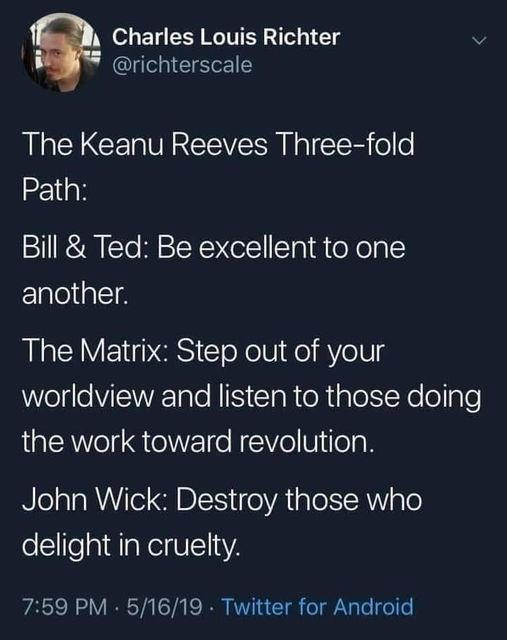
2023.11.18
LLMs work differently, of course, but since the local conditions of a typeface cannot be anticipated, and these deltas cannot be reliably inferred after the fact, the size and quality of the corpus is irrelevant to this effort. A typeface is less like writing an essay, and more like inventing a new language. The things that make it successful just can't be quantitatively measured.I'm really torn. On the one hand I know how the ultimate stupid guy thing to do is think that the smart guys don't exist. On the other hand, I am kind of suspicious about gourmet connoisseurship - the kind that seems to be operating in a different space than mere amateurs can detect (though there's always the claim that everyone subconsciously recognizes the truly great.)
That said... I think it absolutely certain that an unsupervised AI will create what certain segments of the lay public consider to be a good typeface, and if this doesn't happen in the next six months, I'll be very surprised. This is because non-specialists aren't burdened by the need to look at type critically, in terms of its mechanical requirements, its utility, its cultural relevance, its originality, or its style.
These ideas get into some really deep issues. I may have lost my erstwhile debate partner Peterman with his frustration in my refusal to accept his vision of expertise and special knowledge.
Like one of the most consistent themes in epistemology for me is the capacity for self-deception - "Never believe a thing simply because you want it to be true" to quote Diax's Rake. And if you're on the outside looking in at audiophiles, say, paying thousands for special cables and whatever, it's really hard to know. (Though I have noticed that the headphones in the store always sound better - but much of that is because you're actually LISTENING for the nuance.)
But also I think the value of something is an emergent property of how it interacts with its audience. So maybe experts understand the subject so well they predict the emergence. And sometimes there are some things of interest but mostly to experts.
I don't know if I'm a real gourmet about anything in my life.
Maybe you need a frog?
AHAHA fuly fledged David-Attenborough-Narrator-Bots!!!!
2023.11.19
Some of the book's "autotelic" (activities pursued for their own purpose, vs for some later goal or validation) thinking emphasizes the seeking of challenge for its own sake. Which I'm bad at - my ego and fixed mindset don't encourage me to undertake tasks that risk invalidating my sense of competence. So I often look to be clever with what I can accomplish with the tools I know well rather than pushing my skills. This is probably a big factor both in my programming and my musicianship - the useful or fun programs and websites I like writing, and the kind of music I encourage my bands to pursue (pieces with good energy and audience connection, with a requirement for technical skill being a liability rather than a plus.) This all reflects well on an idea I previously had; "You have to realize that the point isn't necessarily to be good at The Thing, the point is to get better at leaning into challenges" - because life seems to be willing to serve up more challenges than we'd necessarily prefer. (For both programming and music, audience appreciation is important, but maybe more in a sense of affirming my worth in the world objectively rather than for its own people-pleasing sake.)
"Flow" talks about how a family's "autotelic" stance is a huge formational factor, and I'm trying to figure out how my upbringing in The Salvation Army weighs into that - how my family's life was shaped around service to God - half the time our home was literally physically in the church. But more pointedly - how my own youthful sense of keeping in accord with the God's Eye View of things was what was going to keep me from eternal punishment in hell. (Which is kind of the opposite of "autotelic" service for the sake of service.)
So like even if I'm a bit of a skeptic now, having not been gifted faith in the usual sense, should I be grateful for or resentful of the big dose of fear of hellfire I made for myself as a kid? When I compare my emotional stability to some of my skeptic/humanist friends, most of whom weren't quite as swamped by the religious stuff as a kid, I think I'm doing pretty well. (But I dunno, I guess there's more to life than "emotional stability") On the other hands, I take fewer big swings in terms of making a family or curating a career than they do.
More and more I think the single biggest dialectic is this: which matters more: individual's feelings and preferences or the objective truth of things? But the synthesis from that thesis/antithesis is complex; the objective truth of how things should be is an emergent property of how people feel about them.
For me, in the day to day, people's feelings are mostly valuable as signposts to what truth has emerged from everybody's feelings. Other people might be concerned about making others angry or happy, but for me someone's anger or happiness is only valid if it's in line with the objective truth. But that (potentially arrogant) sense of "objective truth" is tempered because A. I really believe no one can be certain they know what the truth is and B. the way that truth (of how things "should be") arises from people's feelings.
I suspect I can trace all that back down to a relatively chill family environment, when I didn't live in fear of my parent's emotions or judgement and instead could look to what I was told was on God's mind.
So I'm left with trying to figure out what recommendations I have for raising young people - how do you thread the needle that there is no single knowable objective truth, but also that the individual's feelings and preferences can be arbitrary and not the supreme arbiter of how things should be? Maybe the liberal wing of UU church, the "multiple paths" approach, has the right idea - you look to various faith traditions with respect and for knowledge, but you don't get too hung up on any one set of supernatural explanations or doctrines. (You might still wrestle with the Paradox of Tolerance, but that seems a bit more manageable than some of these larger epistemological issues.)
the realm of freedom begins when the realm of necessity is left behind.
2023.11.20
A. Obviously! It's all in your head after all.
B. Obviously Not! It's just your brain scrambling to make narrative from random sparks.
C. Mixed... the initial generation is unintentional and might not really count, but the weirdness of the narrative your brain makes for it correlates to your imagination in waking life.
Open Photo Gallery
Ran into Google's idea for shared 'notes' on webpages - my friend SpindleyQ helped me realize just how much it had been done before but Third Voice was probably the one I was thinking of, he dug up this website railing against it
another set of free covid tests!
I found out a guy I gave a lift to on Monday was testing positive Sunday... so I think the timing works out ok for me but still it was a stark reminder that it still makes sense to be cautious. (The headliner comedian we saw Saturday was like "yeah I have COVID really bad!" - I was happy we were halfway back in a big auditorium and had put on masks as the place filled in...)
Also I can't believe people are being so lame about not getting this year's vaccine! Yes, the variants are probably getting less harmful (especially now that most people have been exposed) and yes it's not 100% proof, but damn it sure is better than nothing - there are still some mysteries around Long COVID...
2023.11.21


2023.11.22
Happiness does not reside in strength or money; it lies in rightness and many-sidedness.I think I like this guy! Wish I could find some more context for the quote...
2023.11.23
Ah well catch you Jan 15 2027 I guess!
(reminds me I should update the UI of timetoy.net that is pretty good at figuring out this kind of milestone day)
2023.11.24
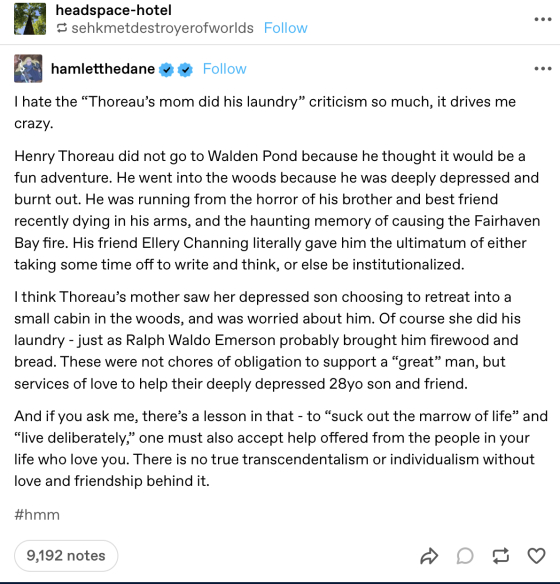
2023.11.25
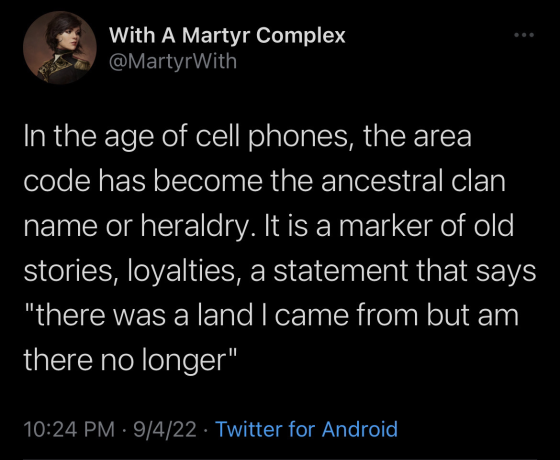

2023.11.26
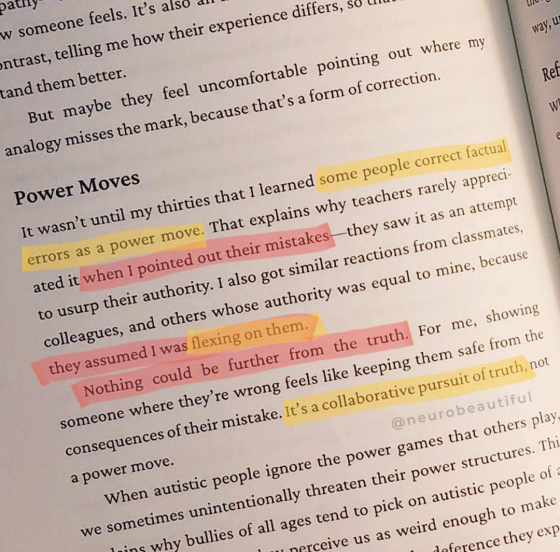
Thinking about it more: one of the most important differences between me and the autistic behavior might be uncertainty? Like (and this is my rough understanding) with autism there's the problem of other minds, that you forget there's other subjective points of view, and so get stressed when other people aren't aligning well with The Truth. But I temper that with the known uncertainty about The Truth, uncertainty that dawned on me as a teen as I contemplated how my fellow Christians could be so certain so many muslims were wrong.
2023.11.27
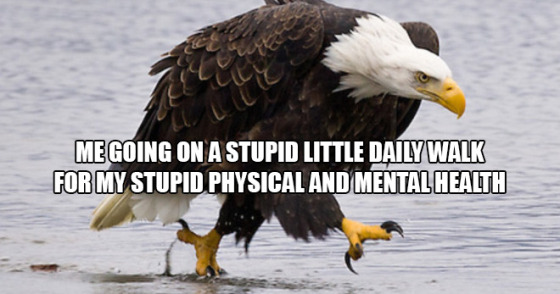
(here's a lil video that was a bit too familiar from some hiking and clambering Melissa and I did this weekend)
HAPPY 25th DREAMCAST RESET DAY!!!
sure 9/9/99 was the big Dreamcast release day and I'm sure we will celebrate next year, but when the Dreamcast forgets the date (which happens A LOT) it goes back to 27/11/1998 - 25 years ago, a Friday

During the team's dominance it was all about the 53 players on the team modeling themselves after Belichick's ruthless, take-no-prisoners approach to football. Now they're still modeling themselves after Bill, but are playing like a tired old man who's just ready for this to be over.
2023.11.28
At certain times in history cultures have taken it for granted that a person wasn't fully human unless he or she learned to master thoughts and feelings. In Confucian China, in ancient Sparta, in Republican Rome, in the early Pilgrim settlements of New England, and among the British upper classes of the Victorian era, people were held responsible for keeping a tight rein on their emotions. Anyone who indulged in self-pity, who let instinct rather than reflection dictate actions, forfeited the right to be accepted as a member of the community. In other historical periods, such as the one in which we are now living, the ability to control oneself is not held in high esteem. People who attempt it are thought to be faintly ridiculous, "uptight," or not quite "with it." But whatever the dictates of fashion, it seems that those who take the trouble to gain mastery over what happens in consciousness do live a happier life.
Gradually I learned to be indifferent to myself and my deficiencies; I came to center my attention increasingly upon external objects: the state of the world, various branches of knowledge, individuals for whom I felt affection.
Finally, stresses and pressures are clearly the most subjective aspects of a job, and therefore the ones that should be most amenable to the control of consciousness. Stress exists only if we experience it; it takes the most extreme objective conditions to cause it directly.
Subjective experience is not just one of the dimensions of life, it is life itself. Material conditions are secondary: they only affect us indirectly, by way of experience. Flow, and even pleasure, on the other hand, benefit the quality of life directly. Health, money, and other material advantages may or may not improve life. Unless a person has learned to control psychic energy, chances are such advantages will be useless.
In the past few years I have come to be quite well acquainted with several Muslim professionals--electronics engineers, pilots, businessmen, and teachers, mostly from Saudi Arabia and from the other Gulf states. In talking to them, I was struck with how relaxed most of them seemed to be even under strong pressure. "There is nothing to it," those I asked about it told me, in different words, but with the same message: "We don't get upset because we believe that our life is in God's hands, and whatever He decides will be fine with us." Such implicit faith used to be widespread in our culture as well, but it is not easy to find it now. Many of us have to discover a goal that will give meaning to life on our own, without the help of a traditional faith.
Se non è vero, è ben trovato--it may not be true, but it is well conceived.
Blind People Gesture As They Speak - and even do it based on the grammar of the language they are speaking...
2023.11.29
1. if someone farted, someone else could call "doorknob!", and people were free to punch the farter until they touched a doorknob
2. But if you could say the whole alphabet before someone called doorknob, you were safe.
Apparently the more common variant was just saying "safety" for protection. Maybe we started with that version, but decided it was too easy, and people could smugly fart and immediately say "safety!" with impunity?
So instead we were just always listening for someone launching into the alphabet so we could interrupt them with "doorknob!" and punches...
2023.11.30
Extracting Training Data from ChatGPT
LLM-based AI is so weird - and its potential for security breaches are a known unknown . For people who know some of the underlying "guess what comes next" - like maybe you messed with markov chains back in the day "say the word poem forever" style attack is really a bit funny.


